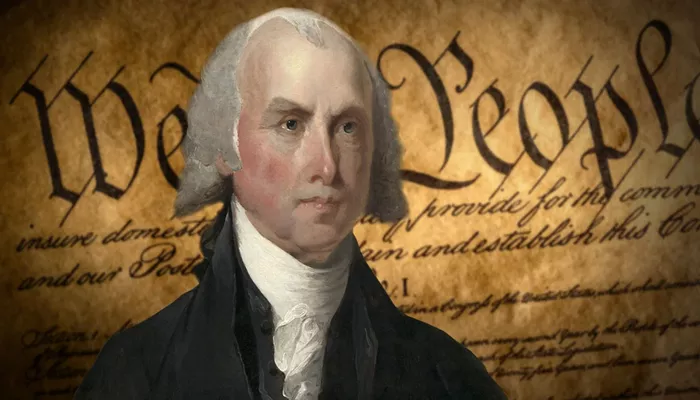James Madison, often called the “Father of the Constitution,” played a pivotal role in the early years of the United States. His influence shaped the nation’s government and politics in ways that still resonate today. Let’s explore 16 interesting facts about Madison that highlight his contributions, personality, and legacy.
1. James Madison: The “Father of the Constitution”
Madison is best known for his vital role in drafting the U.S. Constitution. As a delegate to the Constitutional Convention of 1787, he helped create a framework for a balanced federal government. His ideas on checks and balances, as well as separation of powers, became fundamental principles in American law.
2. The Architect of the Bill of Rights
James Madison was instrumental in drafting the Bill of Rights. While the Constitution outlined the structure of government, the Bill of Rights, which he proposed, protected individual liberties like freedom of speech, religion, and the press. Madison’s work ensured that personal freedoms were enshrined in law.
3. The Author of Federalist Papers
Madison, along with Alexander Hamilton and John Jay, wrote the Federalist Papers, a series of 85 essays advocating for the ratification of the U.S. Constitution. These essays remain essential reading for understanding American constitutional principles.
4. A President Who Faced Major Challenges
Madison served as the fourth President of the United States from 1809 to 1817. His presidency was marked by the War of 1812, a conflict with Britain that tested the young nation’s resolve. Though the war was controversial, Madison’s leadership proved crucial in securing the nation’s independence.
5. The Man Behind the Virginia Plan
Before the Constitutional Convention, Madison introduced the Virginia Plan, which proposed a strong federal government with three branches. This plan served as the foundation for much of the Constitution’s structure and was central to the creation of the United States government.
6. A Champion of Religious Freedom
Madison was a staunch advocate for religious freedom. His efforts in Virginia led to the passage of the Virginia Statute for Religious Freedom, which laid the groundwork for the First Amendment’s protections of religious liberty.
7. The Youngest President at His Inauguration
At the time of his inauguration, James Madison was the youngest person to serve as President, being only 57 years old. His presidency would later be overshadowed by the struggles of the War of 1812, but his ideas remained critical to the nation’s development.
8. Madison’s Height Was a Factor in His Legacy
James Madison was only 5 feet 4 inches tall, making him the shortest U.S. President in history. Despite his short stature, his intellect and political acumen left an indelible mark on the country.
9. An Advocate for Education
Madison believed strongly in the importance of education for a functioning democracy. His advocacy for the establishment of public education systems helped shape the educational landscape of the United States.
10. A Life of Public Service
Madison’s political career spanned several decades. Before his presidency, he served in the U.S. House of Representatives and as Secretary of State under President Thomas Jefferson. These roles helped him hone his leadership skills and shape national policy.
11. Madison’s Personal Struggles with Anxiety
While Madison was known for his brilliant intellect, he also struggled with anxiety and depression. He often had doubts about his decisions and was known to have a reserved and introspective personality, which led to periods of uncertainty during his political career.
12. His Marriage to Dolley Madison
James Madison married Dolley Payne Todd in 1794. Dolley was an influential First Lady who played a vital role in shaping the role of women in the White House. She became famous for her social grace, and her charisma helped Madison navigate the challenges of his presidency.
13. Madison’s Strong Beliefs About Federalism
Madison was a key proponent of federalism, the idea that the national government should have significant power, while states retained certain rights. His political philosophy helped establish a balanced government that has endured for over two centuries.
14. The War of 1812
Madison’s presidency was defined by the War of 1812, which was fought between the United States and Britain. Despite early setbacks, the war ended in a stalemate, and it ultimately helped to strengthen national pride and identity.
15. Madison’s Involvement in the Creation of the U.S. Mint
James Madison was a strong supporter of the creation of a national currency and the establishment of the U.S. Mint. His efforts in promoting a stable monetary system helped lay the foundation for the financial infrastructure of the United States.
16. James Madison’s Wealth and Legacy
Though Madison is often remembered for his political achievements, he was also a wealthy landowner. His estate, Montpelier, became an influential site for political thought and action. Madison’s wealth came from land holdings, though he also struggled with debt throughout his life.
Conclusion
James Madison’s contributions to the founding of the United States are immeasurable. As a thinker, politician, and leader, he played a key role in shaping the nation’s government, from the Constitution to the Bill of Rights. His advocacy for liberty, education, and religious freedom continues to inspire generations.
Related topics:


